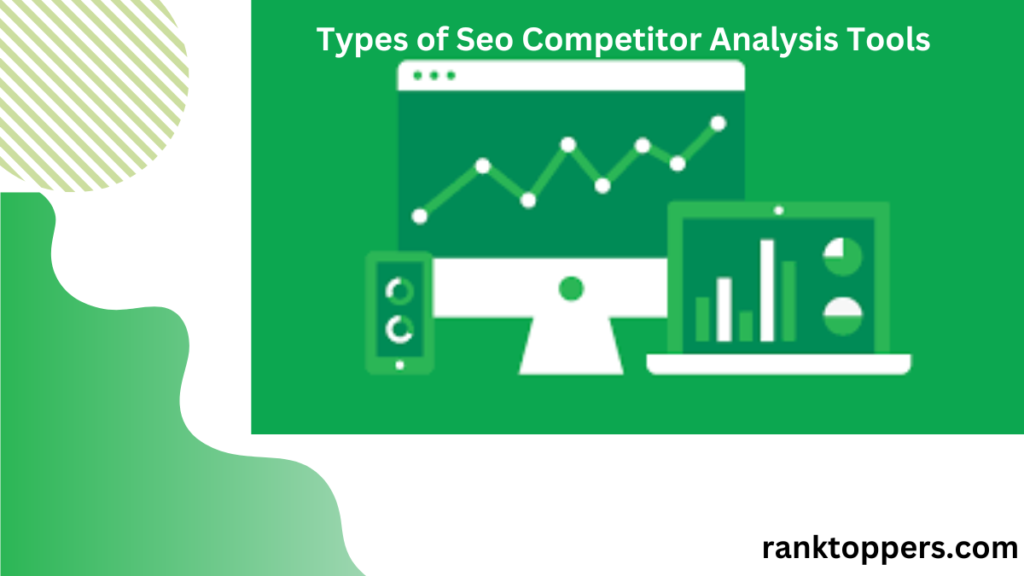SEO Competitor Analysis Tools
Are you tired of watching your competitors skyrocket to the top of search engine rankings while your website languishes on page three? It’s time to level the playing field and unlock the secrets behind their success.
In this blog post, we’re diving deep into the world of SEO competitor analysis tools – essential weapons in any digital marketer’s arsenal. From dissecting their keyword strategies to unraveling their backlink profiles, these powerful tools will empower you with valuable insights that can catapult your own website to new heights. Buckle up and get ready for a thrilling ride through the realm of competitive SEO analysis!
Table of Contents
What is an SEO Competitor Analysis?
So you’ve decided to start your own SEO business, but where do you start? The first step is understanding your competition. Tools like SEMrush and Ahrefs can help you understand what your rivals are doing, how they’re doing it, and what might be working for them that could be hurting your business.
Once you know what your competitors are up to, it’s time to take action. There are a number of tactics you can use to stay ahead of the pack:
- Research keywords and their associated search volumes: Keyword research is essential if you want to stay ahead of the competition. Not only will this give you a good idea of which keywords are being searched for frequently, but it will also show you which ones have the growth potential. Once you have a list of target keywords, start tracking their monthly search volume (in Google AdWords) to see whether or not they’re performing as expected. If not, investigate why and adjust your strategy accordingly.
- Optimize your website for search engine visibility: Page rank is one key factor in determining how visible a website appears in search results pages (SERPs). By optimizing your website for better Page Rank (PR), you can increase the chances that people visiting your site will find the information they’re looking for.
- Hire an SEO expert: Not everyone is equipped to handle SEO tasks on their own, which is why hiring an expert can be a great investment. Not only will they help you optimize your website for better search engine visibility, but they’ll also guide other marketing campaigns that could be effective in reaching your target audience.
- Advertise your website: Advertising your website is another way to reach potential customers. You can use Google AdWords or other online advertising platforms to target specific demographics and interests. By spending strategically, you can reach a large number of people with minimal effort.
- Promote your website content: Content is another important factor in SEO. By writing articles that are well-researched and informative, you can help your site rank higher in search results. You can also promote your content through social media channels (Facebook, Twitter, etc.) to reach a wider audience. By taking these steps, you can position your business as one of the top performers in the SEO industry. A Seo competitor analysis is a tool used to understand the competition and its strategy.
How Can It Help You?
- To improve your SEO, it is important to understand how your competitors are ranking and performing. A variety of SEO competitor analysis tools can help you monitor your performance and identify areas for improvement.
- One such tool is SEMrush. SEMrush allows users to see their website’s traffic sources, SERP features, keywords, competition levels, and more. This information can be used to make strategic changes to optimize your website for better search engine results.
- Other tools include Google Analytics, Ahrefs, and Moz. Google Analytics allows you to track pageviews, unique visitors, conversion rates, AdWords spending data, and more. Ahrefs provides detailed insights into competitor website analytics including audience insights (including age group), traffic sources, referring domains, and site links. Moz tracks over 40 different SEO metrics including keyword difficulty index (KDIs), domain authority, and global search volume data.
- Depending on your business goals and the data available through these tools, a variety of strategies may be appropriate for optimization. For example, if you’re concerned about low traffic levels or high competition in a certain market sector, then tweaking your website’s keyword strategy may be necessary.
- If conversions or ad clicks are important to you but you’re not seeing consistent results from AdWords or other marketing campaigns, then optimizing on those factors may be the best course of action. Regardless of the specific tactics that need to be employed to improve SEO performance overall, using a comprehensive SEO competitor analysis tool can provide a valuable resource for making informed decisions.

Types of Seo Competitor Analysis Tools
Many different tools can be used to analyze your competition’s SEO. These vary in their complexity, cost, and features. Here are some of the most common types of competitor analysis tools:
- Keyword research tools: These tools help you find keywords that are relevant to your business and competitive. They can give you a list of keywords and their estimated monthly search volume (MSV). This information can help you determine which keywords to focus on for your SEO efforts.
- Site analysis tools: These tools help you analyze your competitor’s website design and structure. They can tell you things like the number of pages on the site, the amount of content on each page, and the site’s ranking in Google search results. This information can help you improve your website’s design and structure if it falls short compared to your competitor’s.
- Analytics tools: These tools allow you to track how people are using your website and how they’re interacting with your content. They can also give you information about what content is performing well on the site and where people are clicking on the page content. This information can help you better target your marketing campaigns to reach more people with the right message.
- Social media monitoring tools: These tools help you track your competitor’s social media activity and how it’s impacting your brand. They can tell you how many people are following the competitor’s accounts, what kinds of content are being shared, and which keywords are being used in the posts. This information can help you better understand your competitor’s strategy and how to beat them at their own game.
- Competitor comparison tools: These tools help you compare your company’s performance against your competition. They can give you a ranking of how well your company is doing compared to other companies in the same industry, or across different industries. This information can help you identify areas where you need to improve and make changes to your strategy.
How to Do a Seo Competitor Analysis?
If you want to know how your competitors are doing on SEO or SEO Competitor Analysis Tools working, there are a few tools you can use. For example, SEMrush offers a toolbar that lets you see where your competitors rank for certain keywords, and Ahrefs allows you to track your competitor’s website traffic and other metrics.
You can also use Google Analytics to see what keywords people are clicking on across your site and others. If you’re looking for an expert opinion, ask an SEO consultant what tools they use to analyze their competition.
How to Do a Site Audit?
- A site audit is a comprehensive review of your website’s structure, content, and optimization. A site auditor will look for any issues that could affect your SEO, such as outdated or duplicate content, incorrect title tags and meta descriptions, and missing keywords.
- A site audit can also help you identify potential problems with your website’s design, such as poor navigation or unoptimized images. Once you’ve made the necessary changes, a site audit can help you track the effects of those changes over time.
- To do a site audit yourself, you’ll need to have access to your website’s source code and Google Analytics data. You can find more information on how to do a site audit in our guide on how to do SEO audits.
How to Analyze Your Website’s SEO Performance?
- There are several ways to analyze your website’s SEO performance, including using Google Analytics, SEMrush, and Ahrefs.
- You can use Google Analytics to see how people are browsing your site, what keywords they’re clicking on, and what pages they’re visiting. You can also use this data to identify which pages are performing well and which need further attention.
- SEMrush lets you see where your competitors rank for certain keywords, as well as other metrics such as traffic and CPC (cost per click). Ahrefs also offers a toolbar that lets you track your competitor’s website traffic and other metrics.
- Once you’ve analyzed your website’s SEO performance, make sure to make the necessary changes so that you can continue to improve your ranking.
Conclusion
Thank you for reading our article on SEO competitor analysis tools! In it, we discuss the different types of tools available and give you an overview of what they can do for you. We hope that this article has helped clarify what SEO competitor analysis is and given you some ideas as to how to use these tools to improve your online presence.






